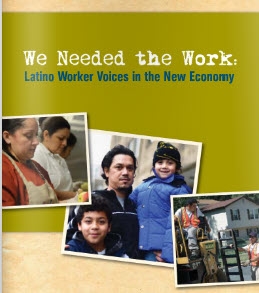Many low-skilled Latino workers, who make up a large share of the low-wage job market, are employed in substandard jobs where they earn below-poverty wages, are denied health and retirement benefits, and are refused paid leave, according to a study by National Council of La Raza (NCRL).

The overrepresentation of Latinos in hazardous occupations and industries, such as construction and agriculture, contributes to their relatively high rates of work-related injuries and fatalities. Even in the midst of the economic recession in 2008, 804 Latinos were killed on the job, the majority of them immigrants. The fatal occupational injury rate for Latinos was 4.0 fatalities per 100,000 workers, compared to 3.7 and 3.5 for White and Black workers, respectively.
In a survey of more than 500 Latinos in the Southeast U.S., 41 percent had experienced wage theft. Two in five Latino workers do not earn sufficient wages to keep their families out of poverty; unpaid wages can be especially damaging to low-income workers and their families whose financial security is already fragile. In 2009, 40 percent of Latino, 33 percent of Black, and 21 percent of White workers earned at or below poverty wages, which were about $10.55 per hour for a family of four.
Due to demographic and labor market shifts, Latinos have emerged as the group most likely to hold jobs with low wages, insufficient benefits, and dangerous working conditions.
In 2010, only 37 percent of Latinos were covered by health insurance sponsored by their employer, and in 2009, only 33 percent of Latinos had access to an employer-based retirement plan. In 2010, 60 percent of the Latino workforce did not receive a single paid sick day. From 1979 to 2006, employer-sponsored health insurance for Hispanics decreased from 60 percent to 37 percent compared to a 10.7-point drop for White and Black workers.
Source: National council of La Raza, “We Needed the Work: Latino Worker Voices in the new Economy”; May 24, 2011.